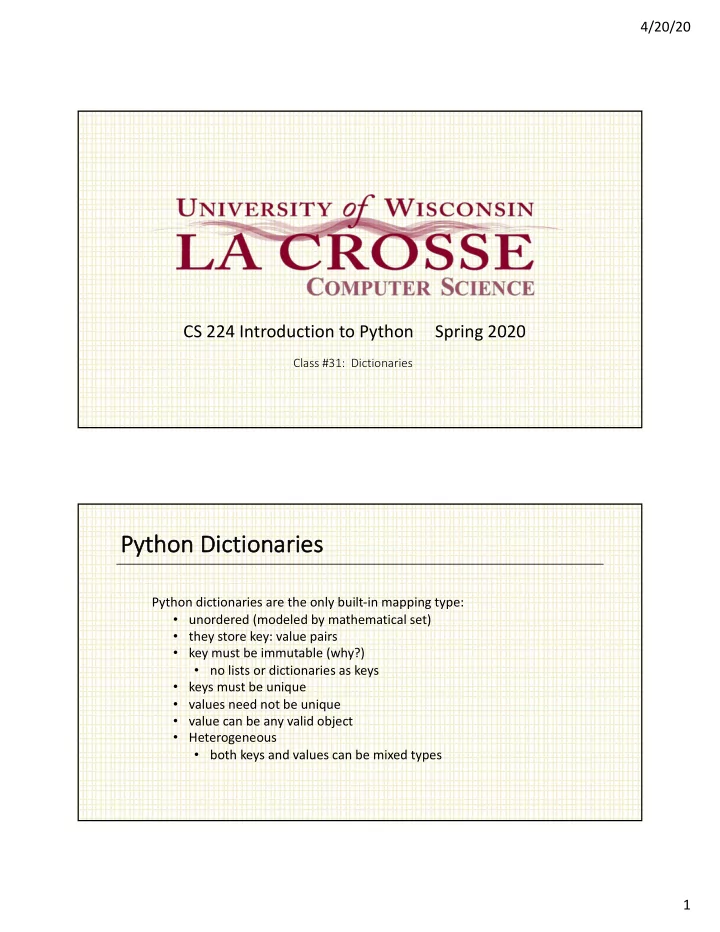

4/20/20 CS 224 Introduction to Python Spring 2020 Class #31: Dictionaries Py Python Dictionaries Python dictionaries are the only built-in mapping type: • unordered (modeled by mathematical set) • they store key: value pairs • key must be immutable (why?) • no lists or dictionaries as keys • keys must be unique • values need not be unique • value can be any valid object • Heterogeneous • both keys and values can be mixed types 1
4/20/20 Cr Creating a diction onary d1 = {1: ‘a’, 2: ‘b’, 3: ’c’} d2 = {5: [5, 10, 15], 10: [10, 20 , 30], ‘a’: 0} d3 = {} d3[10] = ‘ten’ d3[100] = ‘hundred’ d4 = dict() d4[‘Pinto’] = 1.7 d4[‘Bluto’] = 0.0 d4[‘D-Day’] = None Cu Custom om class ob objects as keys To be used as a key an object must be hashable a1 = Account(‘Fred’, 1000) a2 = Account(‘Ethel’, 5000) a1 can’t be hashed so… d = {a1: ‘checking’} TypeError: unhashable instance 2
4/20/20 We We can fix that class Account(object): def __init__(self, name, balance): self.name = name self.balance = balance def __hash__(self): Both return hash((self.name, self.balance)) must be def __eq__(self, other): defined return (self.name, self.balance) == (other.name, other.balance) def deposit(self, amt): self.balance += amt Et Et voila To be used as a key an object must be hashable, and now it is! a1 = Account(‘Fred’, 1000) a2 = Account(‘Ethel’, 5000) d = {a1: ‘checking’, a2: ‘savings’} print(d[a1]) Output: ‘checking’ 3
4/20/20 There’s a big BU BUT Th a1 = Account(‘Fred’, 1000) a2 = Account(‘Ethel’, 5000) d = {a1: ‘checking’, a2: ‘savings’} print(d[a1]) Output: ‘checking’ A change to the instance used as key a1.deposit(100) print(d[a1]) KeyError: <account.Account instance at 0x104eee5f0> Th The moral of the story You can “trick” Python into letting you use instances of a mutable object as a key (by defining __hash__ and __eq__) but if you change the values of the instances, you cause Pypocalypse. 4
4/20/20 Me Method ods: t : the b basics • len(d) : returns number of items • d[k] : returns value associated with k • d[k] = v : sets d[k] to v (defines new item if k not already in d) • del d[k] : removes item with key k from d • k in d : returns True if k is a key in d Making a Ma a c cop opy d.copy() makes shallow copies of the objects in d and puts them in a new dictionary d1 = {‘L1’: [1, 2, 3], ‘L2’: [2, 4, 6]} d2 = d1.copy() d1[L1].append(4) print(d1[L1]) [1, 2, 3, 4] print(d2[L1]) [1, 2, 3, 4] Why? 5
4/20/20 An Another copy example d1 = {‘L1’: [1, 2, 3], ‘L2’: [2, 4, 6]} d2 = d1.copy() d1[L1] = [3, 6, 9] print(d1[L1]) [3, 6, 9] print(d2[L1]) [1, 2, 3] Why? Ex Extendi nding ng a di dictiona nary d1.update(d2) adds all items from d2 to d1 d1 = {1: ‘CS224’, 2: ‘CS120’} d2 = {3: ‘CS225’, 4: ‘CS353’} d3 = {1: ‘CS220’, 5: ‘CS340’} Key Collision: imported item replaces original d2.update(d1) {3: ‘CS225’, 4: ‘CS353’, 1: ‘CS224’, 2: ‘CS120’} d3.update(d1) {5: ‘CS340’, 1: ‘CS224’, 2: ‘CS120’} 6
4/20/20 Me Method ods t that r return rn a a s sequence d.keys() returns a sequence of the keys in d d.values() returns a sequence of the values in d d.items() returns a sequence of all (key, value) pairs in d Method Me ods t that r remo move i items ms d.pop(k [, default]) returns d[k], if found, and removes it from d; otherwise returns default, if supplied or raises KeyError if not – why would you want this? d.popitem() removes a random (key, value) pair from d and returns it as a tuple d.clear() removes all items from d 7
4/20/20 Me Method ods t that r remo move i items ms d.pop(k [, default]) returns d[k], if found, and removes it from d; otherwise returns default, if supplied or raises KeyError if not – why would you want this? Supplying default ( None , for example) allows you to attempt to pop items without concern for whether or not they exist – there is no danger of a KeyError Od Oddities dict.fromkeys(s [, value]) returns a new dictionary with keys taken from sequence s and all values set to value if supplied, None otherwise. Note that it’s a class method. d.get(k [, value]) returns d[k] if found; otherwise returns value if supplied or None if not. Because of this, no chance of KeyError (unlike using d[k]) d.setdefault(k [, value]) returns d[k] if found; otherwise returns value and sets d[k] = value, or None if value not supplied 8
4/20/20 Mor More od oddities list(d) returns a list of the keys from d. This is just casting the dictionary to a list but only the keys are put in the list for e in d: print e -- prints the keys from d for e in d: print e, d[e] -- prints the keys and values from d 9
Recommend
More recommend